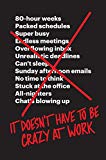It Doesn't Have to Be Crazy at Work, by Jason Fried and David Heinemeier Hanssonk
I recently finished reading It doesn’t have to be crazy at work, by Jason Fried and David Heinemeier Hansson1. Jason and David are the co-founders of Basecamp, a project manager/real-time collaboration tool.
I liked the book very much. The argument is what the title says: it doesn’t have to be crazy at work for a company to be profitable and successful. It doesn’t have to be crazy for you if you are the founder/owner, and if doesn’t have to be crazy for you if you are an employee. Your work should not be equal to your life, and you shouldn’t expect it from your employees.
For context, Basecamp was founded 19 years ago. They’ve been profitable from month one and continue to grow their customer base every year. Although they’ve been contacted in the past by several VC firms, the only external founding they’ve accepted was a minority, no-control stake from Amazon’s founder Jeff Bezos in 2006 2. They are not a public company, and don’t want to be one. They don’t have a CFO, not even a full-time accountant. Basecamp is on Forbes’ list of America’s Best Small Companies 2017. According to Forbes, this 60 employee company has an annual revenue of $25M.
I specially like their view on employees’ benefits3.
(…) we look at benefits as a way to help people get away from work and lead healthier, more interesting lives. Benefits that actually benefit them, not the company. Although the company clearly benefits, too, from having healthier, more interesting, well-rested workers. Not a single benefit is aimed at trapping people at the office. Not a single benefit that would make someone prefer to be at work rather than at home. Not a single benefit that puts work ahead of life. Instead, plenty of reasons to close the laptop at a reasonable time so that there’s time to learn, cook, work out, and live life with family and friends. (p. 117-118)
If you are curious, you can check the Basecamp Employee Handbook.
The point of the book is not to adopt each practice as-is. As the authors say, what’s a best practice for one company is not necessarily so for others. That’s not the point of the book. The real question floating in the pages is: what is your company for?
Of course: be profitable, make money. But how much profit is enough, really?
-
DHH is also known as the creator of the Rails framework for Ruby. In fact, Basecamp was the first Ruby on Rails app ever. ↩
-
cfr ↩
-
Some of the benefits for Basecamp employees are, according to the book: fully paid vacations for everyone in the company up to $5,000 a year. Three-day weekends all summer. 30-day sabbaticals every three years. $1,000 per year continuing-education stipend you can use to learn anything non-work related. One monthly massage at an actual SPA, outside the office. $100 monthly fitness allowance. ↩
